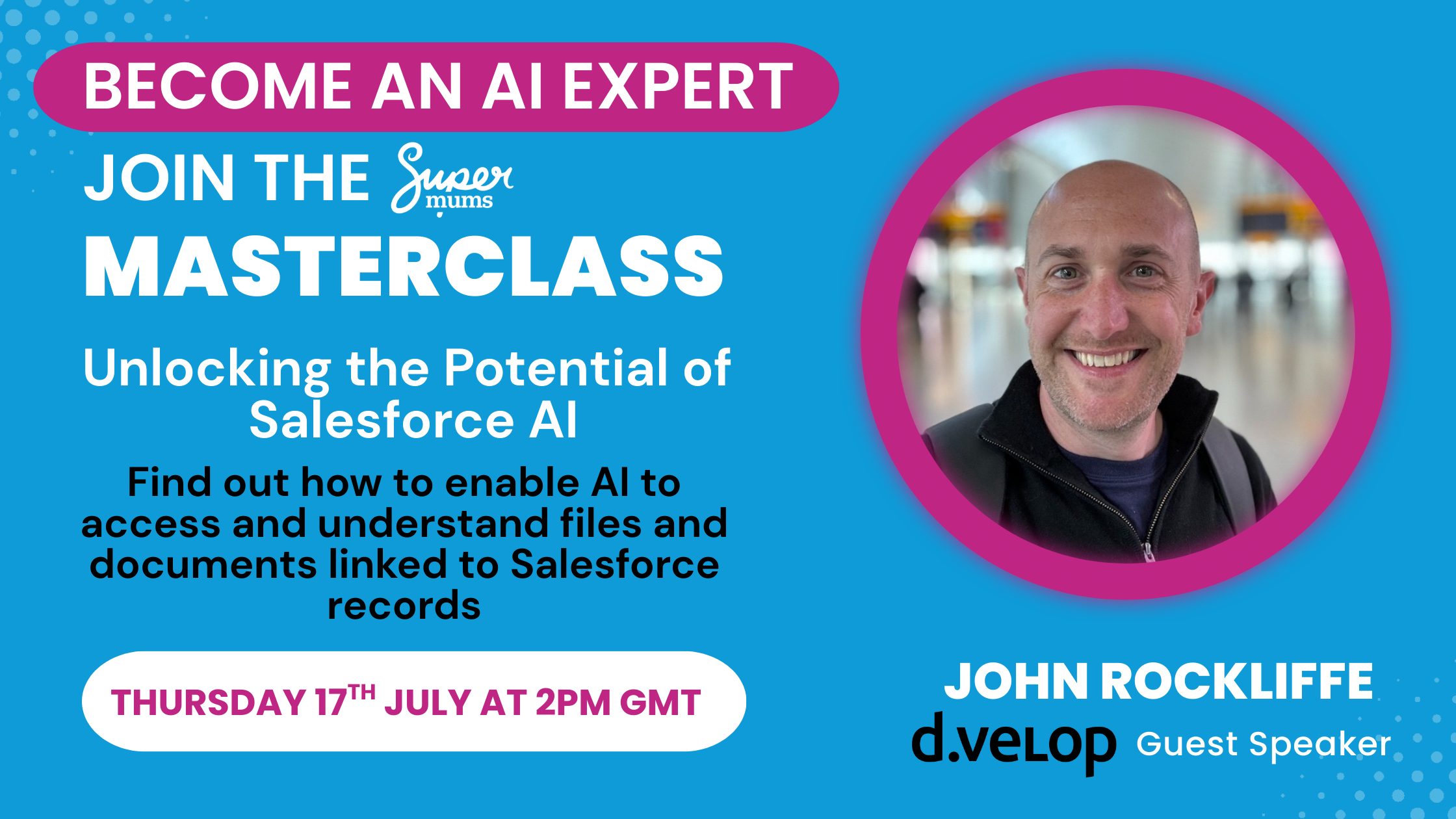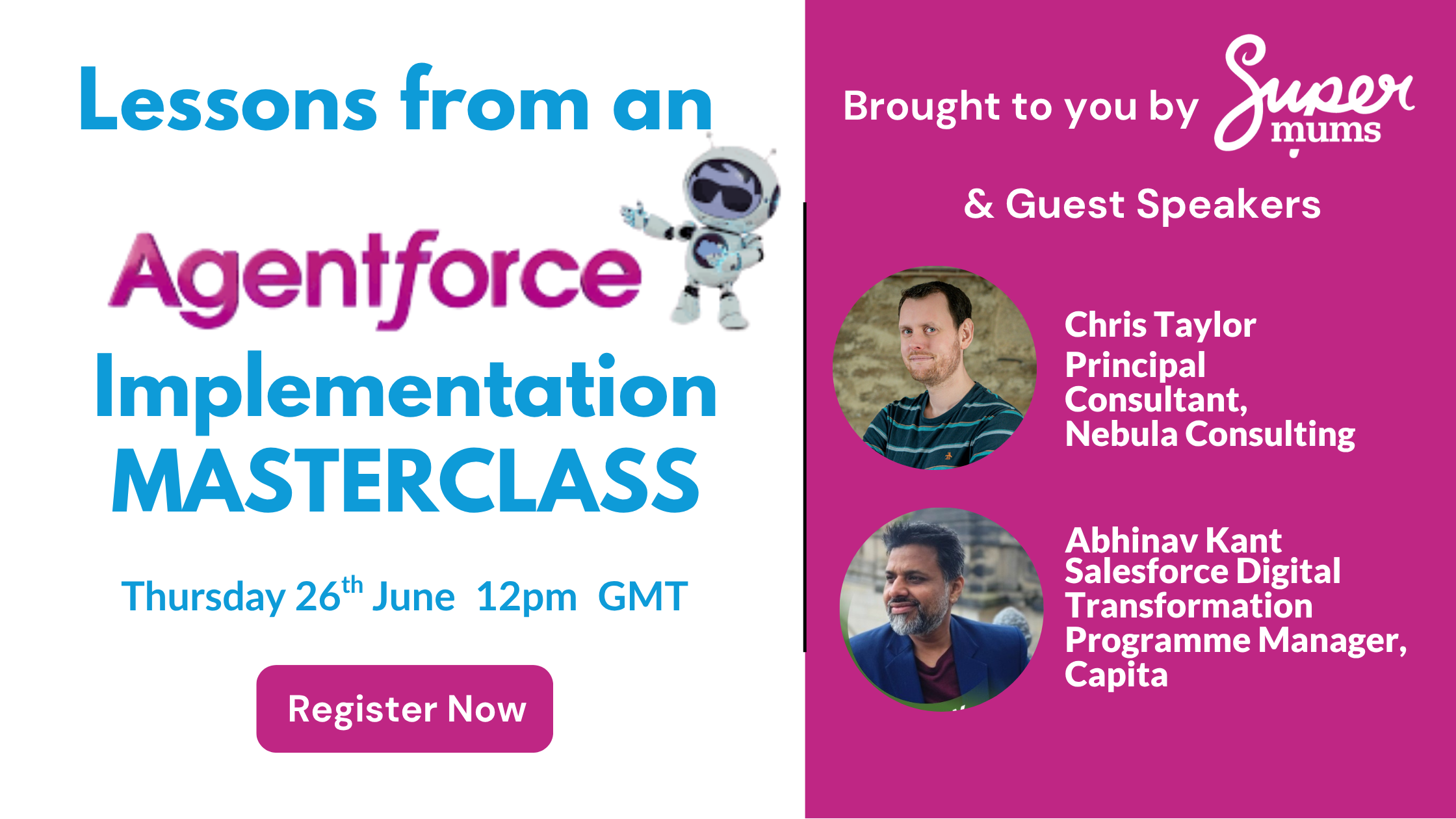Salesforce Sales Cloud vs Revenue Cloud – What’s the Difference?
By Heather Black

How do you Optimise Salesforce Sales Cloud for your end users? During this five-part blog series we are going to look at the ways to maximise the features of Sales Cloud harnessing the power of third party apps to get a full end to end solution for your business.
- Part 1 – How to Optimise the Design of Sales Cloud for Users
- Part 2 – How to Implement a CTI for Sales Cloud
- Part 3 – How to take Payments in Salesforce Sales Cloud
- Part 4 – How to do Financial Accounting in Salesforce Sales Cloud
- Part 5 – Sales Cloud vs Revenue Cloud: What’s the Difference?

Subscribe and never miss out!
To stay up to date with Supermums blogs, latest news, training, course deadlines, offers, events and more, subscribe to our newsletter:
Part 5 – Salesforce Sales Cloud vs Revenue Cloud – What’s the Difference?
What’s the difference between them? The main difference between Salesforce Revenue Cloud and Salesforce Sales Cloud is that Revenue Cloud manages the entire revenue lifecycle, while Sales Cloud focuses on the sales process:
Salesforce Revenue Cloud manages the entire revenue lifecycle, including quoting, billing, revenue recognition, and contract management. It integrates CPQ with other processes to help businesses manage all aspects of their revenue operations in one place.
Sales Cloud focuses on the sales process, with key functionality geared towards account acquisition, the sales funnel, and closing deals. It includes features like lead assignment rules, lead auto-response rules, and web-to-lead.
Frankly Solutions: The Trusted Partner for Transforming Salesforce CPQ & Revenue Lifecycle Management
When it comes to navigating the intricate world of Salesforce CPQ (Configure, Price, Quote) and Revenue Lifecycle Management (RLM), you need a partner who gets it. At Frankly Solutions, we do. Our founders have deep experience, and our people-first culture allows us to think outside the box. Whether you’re looking for smart solutions to streamline your Lead-to-Revenue processes or aiming to boost efficiency on Salesforce, the Frankly Solutions team has you covered.
Introduction to Revenue Lifecycle Management
1. What is the Revenue Lifecycle?
Simply put, the Revenue Lifecycle is how your business turns its products or services into revenue. It starts with the creation of an offer, and moves through pricing and selling it, all the way to managing orders, billing, payments, and recognising revenue. Along this journey, there are plenty of legal, operational, and logistical hurdles that need to be overcome to keep things running smoothly.
Real-World Example: Your Phone and Broadband Subscription
Ever tried to renew your phone or broadband plan? You start with a base subscription, maybe just for broadband, but as you look at options—faster speed, Netflix, Spotify, and cloud storage—things start to snowball. Before you know it, you’re signing up for a fancy router, a software bundle you didn’t even know you needed, and more streaming content than you’ll ever watch. Sound familiar?
The price fluctuates as you make these choices. Once you’re satisfied (or perhaps overspent), you finalise the order and pay any upfront fees. Now the order management team springs into action, setting up your services and shipping that shiny new router.
Meanwhile, your provider monitors your subscription and any extras (like international calls) to bill you properly each month. They’re recording every bit of revenue they generate from your subscription, making sure their finances are in check.
And that, in a nutshell, is Revenue Lifecycle Management! Well, almost…
How did you end up subscribing to a bunch of things you didn’t plan on? That’s where clever Product Managers come in, creating and pricing products designed to pull you in.
2. Revenue Lifecycle Management on the Salesforce Platform
Salesforce Revenue Cloud is a comprehensive solution that manages all aspects of the revenue lifecycle within a single platform. It is an additional Salesforce cloud that extends the capabilities of Sales Cloud and Service Cloud, delivering this whole process seamlessly by managing everything in one place. Here’s what it does:
- Product Management: Simplifies creating complex products with various configurations and pricing models.
- CPQ (Configure, Price, Quote): Automates quoting, ensuring pricing rules and configurations are applied perfectly every time.
- Order & Contract Management: Handles the full order process and contract lifecycle from creation to renewal, eliminating manual errors.
- Billing & Invoicing: Automates billing, supports different models (like subscription or usage-based), and ensures accurate invoicing.
- Revenue Recognition & Intelligence: Ensures compliance with accounting standards by automating revenue recognition and reporting.
Salesforce CPQ vs. Revenue Cloud: What’s the Difference?
While Salesforce CPQ is focused on configuring products, pricing them correctly, and generating quotes, Revenue Cloud goes further. It incorporates all the CPQ capabilities and integrates additional elements like product management, billing, and revenue recognition to give you a full 360° revenue management solution.
3. Why Revenue Cloud Will Revolutionise Your Business
So, why should you care about Revenue Cloud? Here’s what it brings to the table:
- Boosted Efficiency: Automation cuts down manual work, making everything faster and smoother.
- Improved Accuracy: Say goodbye to pricing or invoicing mistakes—Revenue Cloud ensures everything from quotes to revenue recognition is spot-on.
- Better Customer Experience: When your billing, renewals, and contracts run like a well-oiled machine, customers notice. And happy customers stick around.
- Scalability & Flexibility: Whether you’re running a subscription-based business or something more complex, Revenue Cloud adapts to your needs as you grow.
- Future-Proofing: Revenue Cloud continues to evolve, keeping your business ready for the future with the latest innovations in revenue management.
At the end of the day, implementing Revenue Cloud on Salesforce isn’t just about streamlining processes—it’s about transforming your entire revenue operation to provide a unified, efficient, and accurate approach to managing the entire revenue lifecycle. You’ll see better financial results, happier customers, and gain a real competitive edge in your industry. For a successful transformation, it’s key to have the right partner by your side.
To know more reach out now to the Frankly Solutions team.
Thank you to Frankly Solutions for contributing to this article.
Find out more about our Supermums and the Salesforce Training courses that we offer with the support of these great partners:

Written By:
Subscribe To Our Weekly Top Tip Bulletin
Get Updates And Learn From The Best











